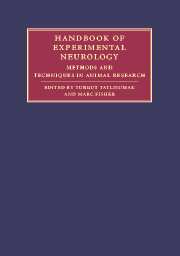Book contents
- Frontmatter
- Contents
- List of contributors
- Part I Principles and general methods
- 1 Introduction: Animal modeling – a precious tool for developing remedies to neurological diseases
- 2 Ethical issues, welfare laws, and regulations
- 3 Housing, feeding, and maintenance of rodents
- 4 Identification of individual animals
- 5 Analgesia, anesthesia, and postoperative care in laboratory animals
- 6 Euthanasia in small animals
- 7 Various surgical procedures in rodents
- 8 Genetically engineered animals
- 9 Imaging in experimental neurology
- 10 Safety in animal facilities
- 11 Behavioral testing in small-animal models: ischemic stroke
- 12 Methods for analyzing brain tissue
- 13 Targeting molecular constructs of cellular function and injury through in vitro and in vivo experimental models
- 14 Neuroimmunology and immune-related neuropathologies
- 15 Animal models of sex differences in non-reproductive brain functions
- 16 The ependymal route for central nervous system gene therapy
- 17 Neural transplantation
- Part II Experimental models of major neurological diseases
- Index
- References
12 - Methods for analyzing brain tissue
Published online by Cambridge University Press: 04 November 2009
- Frontmatter
- Contents
- List of contributors
- Part I Principles and general methods
- 1 Introduction: Animal modeling – a precious tool for developing remedies to neurological diseases
- 2 Ethical issues, welfare laws, and regulations
- 3 Housing, feeding, and maintenance of rodents
- 4 Identification of individual animals
- 5 Analgesia, anesthesia, and postoperative care in laboratory animals
- 6 Euthanasia in small animals
- 7 Various surgical procedures in rodents
- 8 Genetically engineered animals
- 9 Imaging in experimental neurology
- 10 Safety in animal facilities
- 11 Behavioral testing in small-animal models: ischemic stroke
- 12 Methods for analyzing brain tissue
- 13 Targeting molecular constructs of cellular function and injury through in vitro and in vivo experimental models
- 14 Neuroimmunology and immune-related neuropathologies
- 15 Animal models of sex differences in non-reproductive brain functions
- 16 The ependymal route for central nervous system gene therapy
- 17 Neural transplantation
- Part II Experimental models of major neurological diseases
- Index
- References
Summary
Introduction
Analysis of the brain tissue depends on the experimental setup and question, and needs to be decided by each investigator. However, one should bear in mind that the health of animals as well as the diet they eat will inevitably affect the results obtained. Even though it is commonly thought to be so, the experiment does not start from the day the brains are dissected out and subjected to analysis but from the way animals are handled, fed, and cared for.
Fixation of brain tissue
Fixation is needed to stop degradation of the tissue and to preserve both structure and tissue antigens for analysis. Chemicals used for fixation are compounds that form cross-linking bonds between the components of the tissue and thereby literally fix/preserve them in the state they existed during life. The more cross-linking in the fixative, the more it can preserve the structural morphology of the tissue. The most commonly used fixatives in the order of their cross-linking properties are: glutaraldehyde, formaldehyde, paraformaldehyde, and p-benzoquinone. In addition, different alcohols (acetone, methanol) can be used as fixatives, but they dissolve lipids and therefore do not preserve structure as well.
For electron microscopic analysis of the brain, 1–2% glutaraldehyde is the preferred fixative. For immunocytochemical demonstration of tissue antigens at light microscopic level, 2–4% paraformaldehyde or 0.4% p-benzoquinone are the best alternatives.
Information
- Type
- Chapter
- Information
- Handbook of Experimental NeurologyMethods and Techniques in Animal Research, pp. 173 - 180Publisher: Cambridge University PressPrint publication year: 2006
References
Accessibility standard: Unknown
Why this information is here
This section outlines the accessibility features of this content - including support for screen readers, full keyboard navigation and high-contrast display options. This may not be relevant for you.Accessibility Information
- 1
- Cited by
